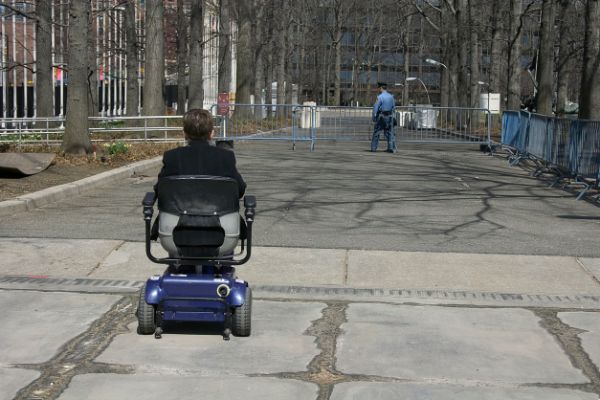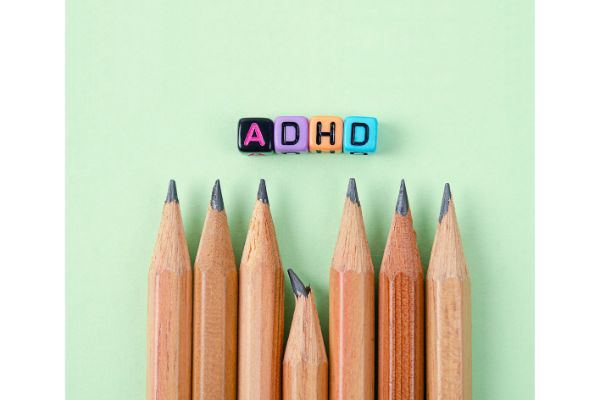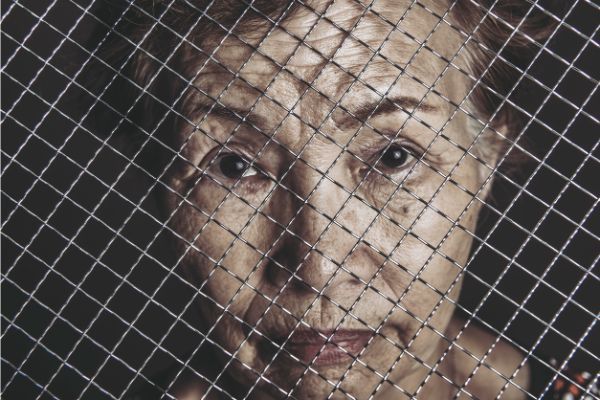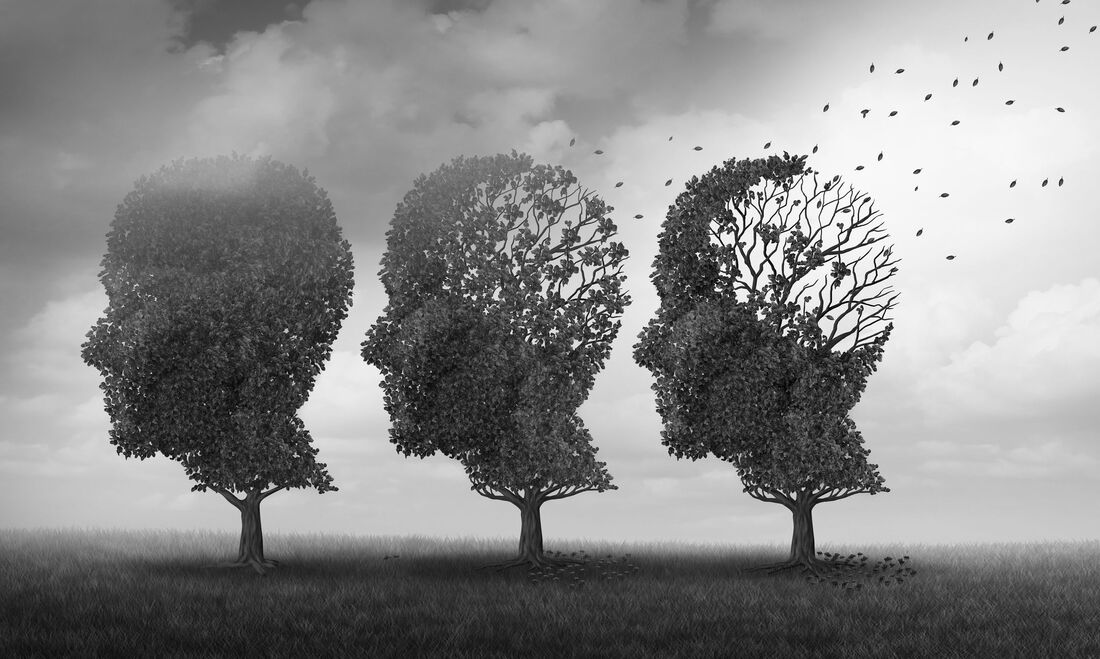|
For individuals with mental disabilities, encounters with law enforcement can quickly escalate into serious situations. Issues with communication can exacerbate the problem. Individuals with communication barriers can be arrested or even become the victims of the use of force by a police officer solely as a result of their disability. The passage of Ohio’s House Bill 115hopes to help avoid dangerous situations between police officers and individuals with communication disabilities.
Communication Disability Registry Under the law, which went into effect in August of last year, any individual with a disability that affects their communications skills can voluntarily submit a verification form which would identify them as having a communication disability. The form requires a physician’s signature verifying the communication disability and a parent’s signature if the individual is under 18 years old. This information is placed in the Law Enforcement Automated Data System (LEADS) and made available to all state and local law enforcement officers. When a police officer runs an individual’s driver’s license or license plate, the information about the communication disability should be indicated. Only general information about the communication disability is disclosed and not the diagnosis of the individual. Communication disabilities can range from hearing impairment to conditions such as PTSD and autism. These conditions are not always understood by law enforcement officers and can become barriers to effective communication. The availability of a registry identifying an individual's communication issue can go a long way toward preventing the escalation of law enforcement interactions. However, along with the information in the registry, law enforcement needs to be given the proper training on how to interact with individuals who have communication disabilities. Participation in the registry is entirely voluntary, and Ohio is taking steps to increase awareness of the program. Law enforcement and other agencies have used social media and other avenues to spread the word. The program will only have a significant impact on the quality of police interactions if it is utilized in a widespread manner. If you or a loved one has a mental disability and has been arrested or convicted of a crime, you need an experienced criminal defense attorney on your side. Elizabeth Kelley specializes in representing individuals with mental disabilities. To schedule a consultation call (509) 991-7058. Mental health on college campuses has gained more awareness. An increasing number of college students suffer from mental health issues and require help from professionals. A 2014 National Survey of College Counseling Centersfound that 52% of the respondent’s clients had severe psychological problems. As a result, colleges are expanding services for students battling conditions such as depression and anxiety. Better and accessible screening, as well as earlier diagnosis, are important factors in improving the quality of mental health care on college campuses.
Accessible Screening and Services Late adolescence and early adulthood are times when many mental health issues begin to manifest. Therefore, in addition to adjusting to college life, many students are coping with the onset of conditions such as depression, schizophrenia, and bipolar disorder. Many students may not know what is happening to them, and it is important for college campuses to conduct screenings to determine whether a student is in need of help. On-campus screenings for possible depression and other conditions can help point students towards services.In addition, access to crisis care can be essential to students with mental disabilities. Crisis hotlines staffed with after hour counselors can be used to triage issues and direct students in crisis to the services they need. The most important quality in mental health services on campus is accessibility to all students. Many campuses simply don't have enough staff to accommodate the students who need help, and students languish on waiting lists. Ensuring that mental health centers have adequate numbers of properly trained staff to help students is an essential duty of any college campus. Early Diagnosis In addition to accessibility, it is important that the staff in campus mental health centers are adequately trained to recognize the symptoms of serious mental illness in college students. Individuals with conditions such as depression, schizophrenia, and bipolar disorder benefit from early treatment and diagnosis. Delayed diagnosis can lead to serious problems with academics and social skills and can lead to college students failing to succeed. If staff are adequately prepared to treat the mental illness of college students, they should have the capability of referring students to providers in the community who can help. If you or a loved one has a mental disability and has been arrested or convicted of a crime, you need an experienced criminal defense attorney on your side. Elizabeth Kelley specializes in representing individuals with mental disabilities. To schedule a consultation call (509) 991-7058. It has become a cliché to say that the jail and prison systems in the United States have become the largest mental health facilities in the country. Mental illness runs rampant throughout correction facilities, and frequently county jails become dumping grounds for those with mental illness. Most jailers don't have the appropriate training to handle inmates with mental illness, and this can result in tragic consequences. Texas has initiated a mental health training program that can hopefully give jailers better tools for dealing with the unique challenges presented by inmates with mental illness.
Training Program At the Brazos County Detention Center, jailers from four Texas counties underwent training on techniques for dealing with inmates who have mental disabilities. Master trainers from the Sheriff’s Office, along with a case manager from the Mental Health Mental Retardation Authority (MHMR) helped to conduct the training which had been developed by the National Institute of Corrections and the Correctional Management Institute of Texas. During the training, actors were used to help demonstrate the situations jailers may encounter with a prisoner with mental illness. In one instance an “inmate” told the jailer that he wanted to be moved to a different cell because the loud sounds of the slamming doors were hard for him to deal with. The jailer spoke calmly to the “inmate” and quickly determined that the “inmate” was a military veteran suffering from PTSD. The jailer was then taught techniques on how to be empathetic and helpful to the “inmate” rather than dismissive. The officers undergoing these training sessions hope to become certified for serving on jail crisis intervention teams. Brazos County’s jail currently has two or three crisis trained deputies on every shift to help handle escalated situations often involving inmates with mental disabilities. These crisis intervention teams meet once a week to discuss the special needs of the inmates and those who have mental health and behavioral issues. While Brazos County has made real strides towards training their jailers on how to address the needs of mentally disabled inmates, the program is not widespread enough. Jails across the country need to provide comprehensive training to their officers on how to handle crisis situations and the special needs of these inmates. If you or a loved one has a mental disability and has been arrested or convicted of a crime, you need an experienced criminal defense attorney on your side. Elizabeth Kelley specializes in representing individuals with mental illness or intellectual/developmental disability. To schedule a consultation call (509) 991-7058. 2/27/2023 New App Bridges Communication Gap Between Police and Individuals with DisabilitiesRead Now Many individuals with mental disabilities have issues communicating properly or acting socially appropriately in a given situation. These communication issues can be especially problematic if a disabled individual encounters law enforcement or other first responders. The police often have no way of knowing that someone has a mental disability and often have no training on how to recognize a disability.
Although it may appear that an individual is refusing to comply with an officer’s orders, it is sometimes the case that the person doesn’t understand the order or doesn’t know how to comply. A person may be acting strangely or erratically, and a police officer may interpret this behavior as aggression. Situations involving law enforcement and those with mental disabilities can have tragic and even deadly results. Bridging the Communication Gap Steven Mase and G.L. Hoffman worked closely with a police officer in Minnesota, parents, and caretakers of individuals with mental disabilities, and other members of the community in developing an app that could help bridge that communication app between people with mental disabilities and first responders. The Vitals mobile app promotes safer interactions by allowing authorized personnel to view a personalized digital profile of individuals with conditions that may affect their communication abilities. The information on the app is specific to the individual which is very important because every individual with a mental disability is different. The Vitals app pairs with a Bluetooth beacon that an individual wears that sends a signal to the law enforcement officer who also has the app. The information transmitted to the app includes the individual’s name, contact information, and condition. It also includes important information about known triggers and helpful de-escalation techniques. The app also allows a family member or caregiver to upload a video message directed to the individual with the disability letting them know that law enforcement is here to help. Developers of the Vitals app are hopeful that with widespread use it can change the tone of interactions between law enforcement and people with mental disabilities. The app is currently being used by 1,800 individuals and 60 law enforcement agencies in Minnesota. The app will hopefully expand to other states soon. If you or a loved one has a mental disability and has been arrested or convicted of a crime, you need an experienced criminal defense attorney on your side. Elizabeth Kelley specializes in representing individuals with mental illness or intellectual/developmental disability. To schedule a consultation call (509) 991-7058. The U.S. Food and Drug Administration (FDA) has approved the first medical device to help children with attention-deficit/hyperactivity disorder (ADHD). The Monarch external Trigeminal Nerve Stimulation (eTENS) system is available for children with ADHD aged 7 to 12 who are not currently taking medication. The device offers the first non-drug treatment for the condition.
What is ADHD? ADHD is a common condition that can be difficult to manage and begins in childhood. Symptoms of ADHD include difficulty focusing, inattention, impulse control issues, and increased physical activity. To be diagnosed with ADHD a person must demonstrate persistent inattention and hyperactivity that has a long-lasting effect and interferes with their daily life. The eTENS System The device requires a prescription and is intended to be used under the close supervision of a caregiver. It is about the size of a cell phone and is designed to generate a low-level electrical pulse to the trigeminal nerve from a wire to a small patch placed above the child’s eyebrows. The trigeminal nerve then sends therapeutic signals to the parts of the brain that are believed to affect ADHD. The child may feel a tingling sensation when the device is working. The device is intended to be used at home while the child is sleeping. Clinical trials of the device have indicated that it may take up to four weeks to begin working properly. A test showed a significant improvement in ADHD symptoms for those patients who used the device for four weeks or more. Side effects of the device include drowsiness, increased appetite, and trouble sleeping. Long term side effects are not currently known because the device is so new. The device should not be used by children under the age of 7 or those that have pacemakers or active implantable neurostimulators. The eTENS system is currently available in Canada, Australia, and Europe and has been used as a device to treat depression. No U.S. release date has been advertised yet. The system is not currently covered by insurance. If you or a loved one has a mental disability and has been arrested or convicted of a crime, you need an experienced criminal defense attorney on your side. Elizabeth Kelley specializes in representing individuals with mental illness or intellectual/developmental disability. To schedule a consultation call (509) 991-7058. Dementia in prison is a rapidly growing problem that most prisons are not equipped to handle. The increasing population of inmates over the age of 65 has led to unique challenges in the prison system. It is estimated that 20% of inmates over the age of 50 suffer from some type of cognitive decline. As inmates in prison age, they experience the same issues, in some cases to a greater degree, that those who are aging on the outside experience.
Proper Training and Care Dementia refers to a decline in mental ability that affects one's day to day life. Individuals with dementia are often confused and have poor memory and cognitive skills. People with dementia require specialized care to help them handle their day to day needs. Due to the confusion they experience, people with dementia frequently act out in ways that are not socially acceptable. This can be especially problematic in a prison setting. Corrections officers don’t typically receive training on how to handle the unique challenges presented by prisoners with dementia. These prisoners may not be able to properly take care of their daily needs or even have the ability to feed themselves. Corrections officers are not trained to provide the proper care needed. Solutions One approach to the prevalence of dementia in the prison system is the development of units within the prison that are specially designed for dementia patients. States like Californiahave been working towards putting these units in place. California currently relies on volunteer inmates as part of their Gold Coat Programand other staff to help those with dementia, but it has been a difficult road. Prisoners with dementia often require around the clock care which is something that prison may not be equipped to handle. They need to be treated in a unit that is more like a nursing home setting. Costs of these units run high, however, and states may not see them as feasible alternatives. However, it is important that dementia patients are treated appropriately for the health and safety of all prisoners. If you or a loved one has a mental disability and has been arrested or convicted of a crime, you need an experienced criminal defense attorney on your side. Elizabeth Kelley specializes in representing individuals with mental illness or intellectual/developmental disability. To schedule a consultation call (509) 991-7058. It is an unfortunate reality that dementia can happen to anyone later in life. Conditions such as Alzheimer’s and other forms of dementia are common. It is estimated that 5.8 millionAmericans suffer from Alzheimer’s disease. It’s a devastating disease that wreaks havoc on families and communities.
What is Dementia? Dementia is a loss of cognitive functioning that affects a person’s daily life. Dementia affects a person’s ability to think, remember, and reason. Skills such as language, reasoning, self-control, and memory can all become seriously impaired. Dementia is not a normal part of aging. It happens when neurons in the brain stop working, lose the connections with other brain cells, and die. Dementia and Crime Dementia can have a profound effect on an individual’s personality and ability to function in society. People who would never commit a crime may find themselves on the wrong side of the criminal justice system. Criminal behavior that starts in mid to late life may be a sign of dementia. People with dementia are often confused and may lash out when they don’t understand what is happening to them. When your 70-year-old aunt, who would never hurt a fly, hits someone at the grocery store, chances are some form of dementia is involved. A 2015 studypublished in the Journal Neurology, found that new, late-onset criminal activity could be a sign of dementia. The study also found that the types of crimes committed varied among dementia patients. The study found that 8% of the Alzheimer's patients studied had been involved in the legal system. Often their crimes involved things like trespassing on private property, traffic violations, or shoplifting. Anti-social behaviors such as public urination and fighting occurred with other forms of dementia such as frontotemporal dementia. Criminal Responsibility The question for our criminal justice system becomes whether those with dementia who commit crimes should be held criminally responsible for their actions. Confusion, lack of impulse control, and lack of memory may indicate that people with dementia who commit crimes are not aware that their actions are criminal. Individuals who have dementia lack the state of mind to be held responsible for their crimes and should be treated and cared for, not placed in the criminal justice system. If you or a loved one has a mental disability and has been arrested or convicted of a crime, you need an experienced criminal defense attorney on your side. Elizabeth Kelley specializes in representing individuals with mental disabilities. To schedule a consultation call (509) 991-7058. Virginia state officials introduced legislation that will write new standards for mental health care in county jails. There has been an increased focus on jails in Virginia after the 2015 death of Jamychael Mitchell in the Hampton Roads Regional Jail. Mitchell suffered from severe mental illness and was not transferred to a state hospital as ordered by a judge. The paperwork ordering the transfer had been lost and Mitchell had been held for four months for stealing snacks from a convenience store. A judge signed off on a $3 million settlement between the jail and Mitchell’s family.
Justice Department Report A 2018 report from the U.S. Justice Department found that medical and mental health care in Virginia jails probably violated the Constitution. The Hampton Roads Regional Jail has been the focus of much of the criticism. The jail has become the dumping ground for most of the sickest inmates in Virginia’s coastal region. The Justice Department report notes that the jail failed to provide adequate medical and mental health care and did not have enough medical staff. The report also took issue with the jail’s use of isolation. The report proposed legislative reforms to develop better standards in jails. One reform would be to develop a statutory definition of “mental illness.” Another proposed reform would make it easier to prosecute medical providers who abuse or neglect an incapacitated adult. Prosecutors also recommended annual unannounced inspections of local jails. New Standards The new standards developed in response to the report include the unannounced annual inspections. Jails would also be required to submit quarterly reports which would be published on the Board of Corrections website. The Board of Corrections is required to work with Department of Behavioral Health and Developmental Standards and the Office of the Inspector General to put together comprehensive new standards in writing by November. A work group had already been formed to put together a starting point for standards that would be consistent across the state’s county jails. If you or a loved one has a mental disability and has been arrested or convicted of a crime, you need an experienced criminal defense attorney on your side. Elizabeth Kelley specializes in representing individuals with mental disabilities. To schedule a consultation call (509) 991-7058. A new smartphone application that works with Google Glass may help boost the social skills of children with autism spectrum disorder (ASD). A small studypublished in the Journal Pediatrics found that over the course of six weeks, children who used the app at home made greater gains in their social abilities than those children who attended therapy alone. While the study is preliminary and the app is not currently commercially available, the results look promising.
Help With Social Skills Many children with autism suffer socially because they are unable to properly recognize and respond to feelings and emotions in others. They typically have particular difficulty recognizing facial expressions. A group of scientists built facial recognition software for Google Glass to help children with autism distinguish between different facial expressions and learn how to interact socially. Google Glass is a brand of smart glasses with an optical head-mounted display that is designed in the shape of glasses. Google Glass displays information like a smartphone in a hands-free way. Wearers of the device can communicate with the internet using voice commands. The new app called “Superpower Glass” helps children decipher what is happening with the people around them. The camera and speaker report information to a smartphone app which is designed to help the children decode what is happening and how to respond. After using Superpower Glass for four 20-minute sessions for six weeks, children scored better on tests of socialization, communication, and behavior. The app relies on artificial intelligence to offer children feedback on social interactions. This helps them learn from experience the appropriate ways to respond in social situations. The app gives the children feedback in real time. When the children look at a face, a green light flashes and an emoji tells the kids what emotion the face is displaying. The study shows promising results but it still remains to be seen whether Superpower Glass is feasible in real-world settings and whether families will actually choose to use the app. If you or a loved one has a mental disability and has been arrested or convicted of a crime, you need an experienced criminal defense attorney on your side. Elizabeth Kelley specializes in representing individuals with mental disabilities. To schedule a consultation call (509) 991-7058. According to a recent studypublished in the Journal Pediatrics, nearly 1 in 7 children between the ages of 6 and 18 suffers from a mental health condition. The study was based on data from the 2016 National Survey of Children’s Health which is a nationwide survey administered to parents. In the survey of the parents of 46.6 million children, 7.7 million had at least one mental health condition. These conditions including things such as depression, anxiety, or attention-deficit/hyperactivity disorder.
Are They Being Treated? Data from the study also showed that about half of the children with mental health conditions go untreated. This is a shockingly high number. Although the percentage of untreated children varied by state, there were several factors that contributed to this number. Some parents and communities attach a stigma to mental health conditions. As a result, families may not feel comfortable accessing mental health resources. In addition, some families do not have insurance or financial resources to seek treatment. Treatment for mental health conditions usually require regular therapy or doctor visits and the costs can add up. In addition, according to datafrom the American Academy of Child and Adolescent Psychiatry, a majority of the country is facing a severe shortage of mental health providers for children and adolescents. This can lead to families waiting on long lists to receive treatment. Symptoms can worsen while children await care. More Access to Treatment In order to get children the treatment they need, many pediatrician’s offices have added a mental health component to their practice. Pediatricians are often the first healthcare providers to recognize the symptoms of a mental health condition in children. If they are able to work closely with mental health providers, this can lead to faster and more effective, integrated treatment for children with mental health conditions. Untreated mental health conditions in children and adolescents can have serious consequences. It can disrupt their ability to function at home, school, and in the community. This puts them at an increased risk of failing in school, having contact with the criminal justice system and even suicide. If you or a loved one has a mental disability and has been arrested or convicted of a crime, you need an experienced criminal defense attorney on your side. Elizabeth Kelley specializes in representing individuals with mental disability. To schedule a consultation call (509) 991-7058. |
Details
Archives
March 2024
Categories |










 RSS Feed
RSS Feed